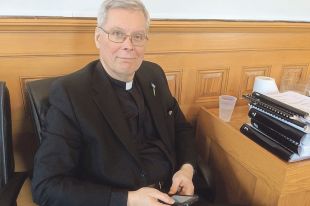Woman Recalls Father’s Tears When Leaving Boys at Mount Cashel
By Barb Sweet
It was the first time she had ever seen her father cry, a woman said of when her brothers were dropped off several decades ago at the former Newfoundland orphanage known as Mount Cashel. © Barb Sweet/The?Telegram Father Francis Puddister, a vicar general of the Archdiocese of St. John’s, was one of two witnesses who testified at the Mount Cashel civil trial Tuesday. One of the woman’s brothers is a John Doe who says the Catholic Church should be held liable for abuse by certain members of the lay order Christian Brothers at the infamous orphanage during the 1940s to early 1960s. The church contends it did not oversee the orphanage’s operations, and therefore is not responsible. The John Doe — one of four test cases representing about 60 former orphanage residents who say they were physically and sexually abused by the Brothers — has already told the civil trial at the Supreme Court of Newfoundland and Labrador that his once-promising career and marriage were ruined by the after-effects of the abuse, as his life spiralled downward due to alcoholism. Like others, he’d described life at Mount Cashel as horrific. The woman who testified Tuesday, however, described her time at the private Littledale girls’ boarding school in St. John’s run by Sisters of Mercy nuns as “wonderful.” She went on to join the convent and receive a post-secondary education before leaving the order in her middle age. Now a senior, the woman — who cannot be named due to a publication ban on the identity of her brother and other former residents — recalled her only memory of her mother is when she was carried out on a stretcher from their central Newfoundland home and subsequently died in St. John’s. She was three, and two of her three younger brothers were babies. A grandmother helped the woman’s father look after them at home, and the woman said she has fond memories of her father, who would sometimes scoop her up and dance to “Jubilee” icon Don Messer’s music. But by the time she was 10, the grandmother moved to Toronto to live with family, and her father wanted to keep the three boys together, and the only option was Mount Cashel. The father had tuberculosis and the woman figures his health must have been getting worse, as they boarded the train to St. John’s with another relative and dropped the boys off at Mount Cashel. Then she was taken to Littledale. “It was the first time he cried. I hever saw him cry,” she said. He died in the early 1950s. In cross-examination by Chris Blom, representing the Roman Catholic Church, the woman was asked about whether or not her father was an alcoholic. She said she never saw any signs of that. She described her relationship with her brothers as strained, with few visits once the boys were at Mount Cashel and she was in Littledale — they had little to say to each other and never shared confidences. One brother she knew a little better later in life, she said. “I have said that to my husband several times — I really did not know him well,” she said of her John Doe brother. Also on the stand Tuesday was Father Francis Puddister, a vicar general of the Archdiocese of St. John’s, a high-ranking official. Former orphanage residents’ lawyer Geoff Budden was challenged by church lawyer Mark Frederick in his questioning of Puddister on the church’s responsibility when a fired employee came to the Palace — the church’s headquarters — in 1954 to say that another employee had sexual relations with a boy at the orphanage. The archbishop at the time was in Rome, but got a report when he returned. Justice Alphonsus Faour allowed the questioning, although he noted it was marginal relevance. Puddister doesn’t have anything to do with the events at Mount Cashel — he was not even ordained as a priest until the late 1970s and is not an expert on canon law. But he has had judicial roles within the church. Puddister had been questioned years ago during a discovery — part of the preliminary process of a lawsuit — and his testimony Tuesday reflected on those answers as well as his views now. “It wasn’t exactly a hands-off situation,” Puddister said of the allegation in 1954 and agreed it falls under moral transgressions that the archbishop would have had the right to intervene under the canon law code in effect at the time. “I would think (the archbishop and his officials) would see this information as probably very troubling to them and they felt they should do something,” Puddister said. There was some back and forth between Budden and Puddister regarding whether it was a right or an obligation to intervene. (The Christian Brothers, as an order of pontifical rite, had their own hierarchy.) “In terms of what he has to do, it was not really specified,” Puddister said of the canon code that existed then. Frederick asked Puddister if the archdiocese carried out its responsibility in relation to the 1954 incident — the court has already heard the Brother Superior of the orphanage was summoned to the Palace and the employee accused of the abuse was told to stay away from the orphanage. “In my opinion, it did,” Puddister said. The trial continues Wednesday. Follow live tweets from the courtroom at bsweettweets. Contact: bsweet@thetelegram.com
|
.
Any original material on these pages is copyright © BishopAccountability.org 2004. Reproduce freely with attribution.
